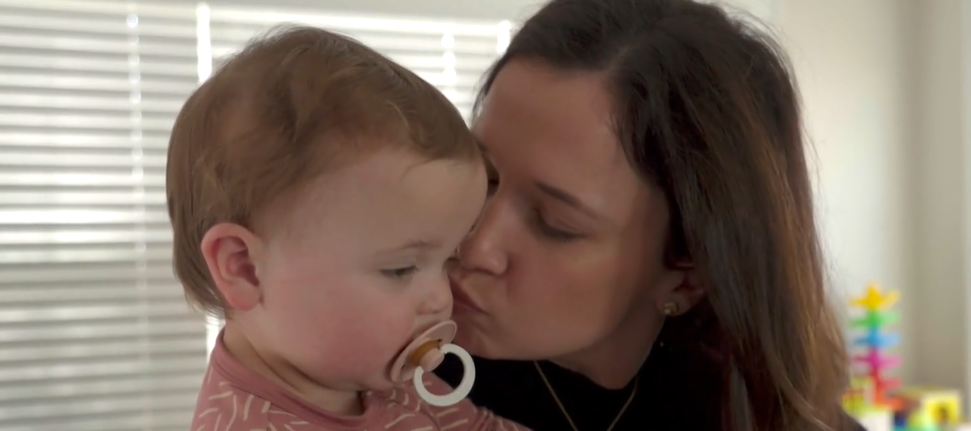After near-death experience, mom looks to raise awareness for amniotic fluid embolism

Annie Sterle suffered an amniotic fluid embolism (AFE) during labor.
By Beret Leone
Click here for updates on this story
MINNEAPOLIS, Minnesota (WCCO) — The birth of a child is typically the happiest day in a parent’s life. But for a Minneapolis family, it started a mother’s fight for her life.
About five years ago, in the thick of COVID, Tony and Annie Sterle went to the hospital eager to meet their son. But things didn’t go as planned.
“There was a time when I wanted to be a vet, there was a time when I wanted to be an actress and all the things, but kind of underlying all of that, I always wanted to be a mom,” Annie Sterle said. “I feel like I now get to have the motherhood that I always dreamed of, despite the very bumpy road it took to get here.”
It started with a planned induction in March 2020.
“You go in thinking, ‘Oh, this is going to be the best day of my life, right? And then suddenly it’s the worst of your life.'” Tony Stelre said.
During labor, Annie Sterle suffered an amniotic fluid embolism (AFE).
“It’s considered a catastrophic complication of delivery,” Minneapolis Heart Institute Interventional Cardiologist Dr. Michael Mooney said.
Mooney says AFE is rare, but it’s also one of the most fatal complications in childbirth. It’s when amniotic fluid enters the bloodstream, causing devastating bleeding and, often, heart failure.
Annie Sterle went into cardiac arrest and had multiple strokes.
“The time came and Annie needed to go on a heart-lung machine immediately and we were ready for it,” Mooney said. “So this seeming miracle actually rose out of a lot of work leading up to being prepared.”
Annie Sterle was put into a coma, while Tony Sterle took their newborn son, Henry Sterle, home alone.
“We didn’t know if it was going to be forever. And, you know, I guess the longer a coma goes on, the less likely somebody is to wake up or regain function,” Tony Sterle said.
AFE isn’t predictable, preventable or treatable. Once an episode happens, survival rates are between 20 to 60%.
“In Annie’s case, the survival rate was less than 10%,” Mooney said.
Annie Sterle spent weeks in a coma, finally waking up on day 17. But in the thick of COVID, Annie Sterle wouldn’t meet her son until nearly a month after she had given birth. The meeting was a moment filled with joy, but also a new form of grief.
“So many of the plans you make for your baby and for these moments are just, you know, taken,” Annie Sterlesaid.
Annie Sterle was left with paralysis in numerous parts of her body. After months of work, she made a full recovery. What wasn’t seen as plainly was her mental battle. She fought for her life — and not alone.
“Community just matters so much, and showing up for people matters so much, and acknowledging all the types of losses and allowing people to feel what they’re feeling is really important,” she said.
Her recovery is nothing short of a miracle, just like baby number two, a daughter named Helena.
“I would say several times a day, I do reflect back on the gift it is to still be here and have that perspective even when things are hard,” Annie Sterle said. “Because there wasn’t going to be the case for a while.”
AFE isn’t more likely to happen a second time, but try telling your emotions that.
“Going into our second pregnancy, well, I believe that intellectually, right. But it’s definitely more challenging to believe it emotionally,” Tony Sterle said.
Although the second pregnancy was nerve-wracking, it was also healing.
“Once she was born and I was still there, it was a very healing experience,” Annie Sterle said. “We’re grateful she’s part of our family now.”
Annie Sterle’s main mission in sharing her story is to raise AFE awareness, which she hopes will lead to answers and a cure.
One way she’s doing that is through a documentary released last fall.
It’s called “24 Days Without You,” which is the amount of time Annie Sterle spent away from her son after he was born. You can rent or request to view the film here.
“This was the most satisfying and remarkable care in a 40-year career,” Mooney said. “And part of it that makes it so special is Annie and who she is.”
Please note: This content carries a strict local market embargo. If you share the same market as the contributor of this article, you may not use it on any platform.
